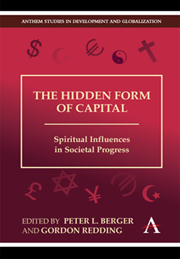Book contents
- Frontmatter
- Contents
- Contributors
- Preface
- Chapter 1 Introduction: Spiritual, Social, Human, and Financial Capital
- Chapter 2 Do Some Religions Do Better than Others?
- Chapter 3 Spiritual Capital and Economic Development: An Overview
- Chapter 4 The Possibilities and Limitations of Spiritual Capital in Chinese Societies
- Chapter 5 How Evangelicanism – Including Pentecostalism – Helps the Poor: The Role of Spiritual Capital
- Chapter 6 Flying under South Africa's Radar: The Growth and Impact of Pentecostals in a Developing Country
- Chapter 7 Importing Spiritual Capital: East-West Encounters and Capitalist Cultures in Eastern Europe After 1989
- Chapter 8 Orthodox Spiritual Capital and Russian Reform
- Chapter 9 Islam and Spiritual Capital: An Indonesian Case Study
- Chapter 10 Separating Religious Content from Religious Practice: Loose and Tight Institutions and their Relevance in Economic Evolution
Chapter 9 - Islam and Spiritual Capital: An Indonesian Case Study
Published online by Cambridge University Press: 05 March 2012
- Frontmatter
- Contents
- Contributors
- Preface
- Chapter 1 Introduction: Spiritual, Social, Human, and Financial Capital
- Chapter 2 Do Some Religions Do Better than Others?
- Chapter 3 Spiritual Capital and Economic Development: An Overview
- Chapter 4 The Possibilities and Limitations of Spiritual Capital in Chinese Societies
- Chapter 5 How Evangelicanism – Including Pentecostalism – Helps the Poor: The Role of Spiritual Capital
- Chapter 6 Flying under South Africa's Radar: The Growth and Impact of Pentecostals in a Developing Country
- Chapter 7 Importing Spiritual Capital: East-West Encounters and Capitalist Cultures in Eastern Europe After 1989
- Chapter 8 Orthodox Spiritual Capital and Russian Reform
- Chapter 9 Islam and Spiritual Capital: An Indonesian Case Study
- Chapter 10 Separating Religious Content from Religious Practice: Loose and Tight Institutions and their Relevance in Economic Evolution
Summary
One of the great coincidences of late last century was the emergence of a ‘third wave’ of democratization at the same time that much of the world was undergoing a powerful religious revival. Although religious organizations played a supporting role in democratic transitions in Spain, Poland, the Philippines, and Indonesia, many political analysts seemed to feel that democratization and religious revival had little to do with each other. Indeed, if they took notice of the revival at all, most analysts viewed it with concern. They worried that religion might stir up sentiments incompatible with democracy, opening the way to the scenario outlined in Samuel Huntington's ‘clash of civilizations’ (Huntington 1996).
Another indication of the ships-passing-in-the night approach to these two events was that one of the more potent theoretical concepts developed in the 1990s for understanding democratization, i.e., the concept of social capital, was at first rarely applied to religious organizations. In the literature on politics and democracy, social capital has been the subject of myriad definitions, not all of them compatible (see below). In the 1990s, however, Robert Putnam's seminal works on civic traditions in modern Italy (Putnam 1993) and the putative decline of social capital in the United States (Putnam 1995, 2000) catapulted the concept to the centre of political discussion.
Putnam defined social capital as ‘features of social life – networks, norms, and trust – that enable participants to act together more effectively to pursue shared objectives’ (1995, 664–5).
- Type
- Chapter
- Information
- The Hidden Form of CapitalSpiritual Influences in Societal Progress, pp. 191 - 212Publisher: Anthem PressPrint publication year: 2010
- 4
- Cited by



